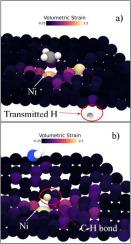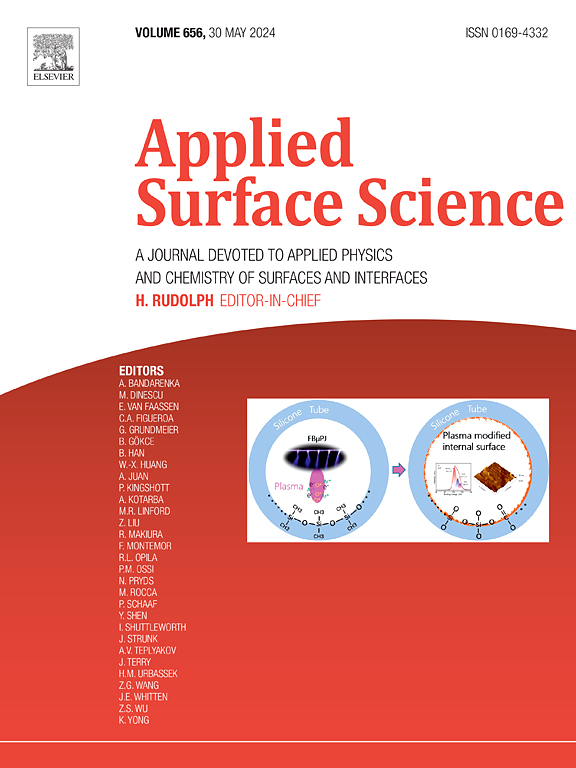求助PDF
{"title":"Dissociative mechanism from NH 3 and CH4 on Ni-doped graphene: Tuning electronic and optical properties","authors":"A. Aligayev, U. Jabbarli, U. Samadova, F.J. Dominguez–Gutierrez, S. Papanikolaou, Qing Huang","doi":"10.1016/j.apsusc.2024.162022","DOIUrl":null,"url":null,"abstract":"In this study, we employ a multi-scale computational modeling approach, combining density functional theory (DFT) and self-consistent charge density functional tight binding (SCC-DFTB), to investigate hydrogen (H<span><span style=\"\"></span><span data-mathml='<math xmlns=\"http://www.w3.org/1998/Math/MathML\"><msub is=\"true\"><mrow is=\"true\" /><mrow is=\"true\"><mn is=\"true\">2</mn></mrow></msub></math>' role=\"presentation\" style=\"font-size: 90%; display: inline-block; position: relative;\" tabindex=\"0\"><svg aria-hidden=\"true\" focusable=\"false\" height=\"1.509ex\" role=\"img\" style=\"vertical-align: -0.582ex;\" viewbox=\"0 -399.4 453.9 649.8\" width=\"1.054ex\" xmlns:xlink=\"http://www.w3.org/1999/xlink\"><g fill=\"currentColor\" stroke=\"currentColor\" stroke-width=\"0\" transform=\"matrix(1 0 0 -1 0 0)\"><g is=\"true\"><g is=\"true\"></g><g is=\"true\" transform=\"translate(0,-150)\"><g is=\"true\"><use transform=\"scale(0.707)\" xlink:href=\"#MJMAIN-32\"></use></g></g></g></g></svg><span role=\"presentation\"><math xmlns=\"http://www.w3.org/1998/Math/MathML\"><msub is=\"true\"><mrow is=\"true\"></mrow><mrow is=\"true\"><mn is=\"true\">2</mn></mrow></msub></math></span></span><script type=\"math/mml\"><math><msub is=\"true\"><mrow is=\"true\"></mrow><mrow is=\"true\"><mn is=\"true\">2</mn></mrow></msub></math></script></span>) production and dissociation mechanisms from ammonia (NH<span><span style=\"\"></span><span data-mathml='<math xmlns=\"http://www.w3.org/1998/Math/MathML\"><msub is=\"true\"><mrow is=\"true\" /><mrow is=\"true\"><mn is=\"true\">3</mn></mrow></msub></math>' role=\"presentation\" style=\"font-size: 90%; display: inline-block; position: relative;\" tabindex=\"0\"><svg aria-hidden=\"true\" focusable=\"false\" height=\"1.509ex\" role=\"img\" style=\"vertical-align: -0.582ex;\" viewbox=\"0 -399.4 453.9 649.8\" width=\"1.054ex\" xmlns:xlink=\"http://www.w3.org/1999/xlink\"><g fill=\"currentColor\" stroke=\"currentColor\" stroke-width=\"0\" transform=\"matrix(1 0 0 -1 0 0)\"><g is=\"true\"><g is=\"true\"></g><g is=\"true\" transform=\"translate(0,-150)\"><g is=\"true\"><use transform=\"scale(0.707)\" xlink:href=\"#MJMAIN-33\"></use></g></g></g></g></svg><span role=\"presentation\"><math xmlns=\"http://www.w3.org/1998/Math/MathML\"><msub is=\"true\"><mrow is=\"true\"></mrow><mrow is=\"true\"><mn is=\"true\">3</mn></mrow></msub></math></span></span><script type=\"math/mml\"><math><msub is=\"true\"><mrow is=\"true\"></mrow><mrow is=\"true\"><mn is=\"true\">3</mn></mrow></msub></math></script></span>) and methane (CH<span><span style=\"\"></span><span data-mathml='<math xmlns=\"http://www.w3.org/1998/Math/MathML\"><msub is=\"true\"><mrow is=\"true\" /><mrow is=\"true\"><mn is=\"true\">4</mn></mrow></msub></math>' role=\"presentation\" style=\"font-size: 90%; display: inline-block; position: relative;\" tabindex=\"0\"><svg aria-hidden=\"true\" focusable=\"false\" height=\"1.509ex\" role=\"img\" style=\"vertical-align: -0.582ex;\" viewbox=\"0 -399.4 453.9 649.8\" width=\"1.054ex\" xmlns:xlink=\"http://www.w3.org/1999/xlink\"><g fill=\"currentColor\" stroke=\"currentColor\" stroke-width=\"0\" transform=\"matrix(1 0 0 -1 0 0)\"><g is=\"true\"><g is=\"true\"></g><g is=\"true\" transform=\"translate(0,-150)\"><g is=\"true\"><use transform=\"scale(0.707)\" xlink:href=\"#MJMAIN-34\"></use></g></g></g></g></svg><span role=\"presentation\"><math xmlns=\"http://www.w3.org/1998/Math/MathML\"><msub is=\"true\"><mrow is=\"true\"></mrow><mrow is=\"true\"><mn is=\"true\">4</mn></mrow></msub></math></span></span><script type=\"math/mml\"><math><msub is=\"true\"><mrow is=\"true\"></mrow><mrow is=\"true\"><mn is=\"true\">4</mn></mrow></msub></math></script></span>) on pristine and nickel-doped graphene. These two-dimensional materials hold significant potential for applications in advanced gas sensing and catalysis. Our analysis reveals that Ni-doped graphene, validated through work function calculations, is a promising material for gas separation and hydrogen production. The samples with adsorbed molecules are characterized by calculating chemical potetential, chemical hardness, electronegativyt, electrophilicity, vibrational frequencies, adsorbtion and Gibbs energies by DFT calculations. Methane molecules preferentially adsorb at the hexagonal ring centers of graphene, while ammonia interacts more strongly with carbon atoms, highlighting distinct molecular doping mechanisms for CH<span><span style=\"\"></span><span data-mathml='<math xmlns=\"http://www.w3.org/1998/Math/MathML\"><msub is=\"true\"><mrow is=\"true\" /><mrow is=\"true\"><mn is=\"true\">4</mn></mrow></msub></math>' role=\"presentation\" style=\"font-size: 90%; display: inline-block; position: relative;\" tabindex=\"0\"><svg aria-hidden=\"true\" focusable=\"false\" height=\"1.509ex\" role=\"img\" style=\"vertical-align: -0.582ex;\" viewbox=\"0 -399.4 453.9 649.8\" width=\"1.054ex\" xmlns:xlink=\"http://www.w3.org/1999/xlink\"><g fill=\"currentColor\" stroke=\"currentColor\" stroke-width=\"0\" transform=\"matrix(1 0 0 -1 0 0)\"><g is=\"true\"><g is=\"true\"></g><g is=\"true\" transform=\"translate(0,-150)\"><g is=\"true\"><use transform=\"scale(0.707)\" xlink:href=\"#MJMAIN-34\"></use></g></g></g></g></svg><span role=\"presentation\"><math xmlns=\"http://www.w3.org/1998/Math/MathML\"><msub is=\"true\"><mrow is=\"true\"></mrow><mrow is=\"true\"><mn is=\"true\">4</mn></mrow></msub></math></span></span><script type=\"math/mml\"><math><msub is=\"true\"><mrow is=\"true\"></mrow><mrow is=\"true\"><mn is=\"true\">4</mn></mrow></msub></math></script></span> and NH<span><span style=\"\"></span><span data-mathml='<math xmlns=\"http://www.w3.org/1998/Math/MathML\"><msub is=\"true\"><mrow is=\"true\" /><mrow is=\"true\"><mn is=\"true\">3</mn></mrow></msub></math>' role=\"presentation\" style=\"font-size: 90%; display: inline-block; position: relative;\" tabindex=\"0\"><svg aria-hidden=\"true\" focusable=\"false\" height=\"1.509ex\" role=\"img\" style=\"vertical-align: -0.582ex;\" viewbox=\"0 -399.4 453.9 649.8\" width=\"1.054ex\" xmlns:xlink=\"http://www.w3.org/1999/xlink\"><g fill=\"currentColor\" stroke=\"currentColor\" stroke-width=\"0\" transform=\"matrix(1 0 0 -1 0 0)\"><g is=\"true\"><g is=\"true\"></g><g is=\"true\" transform=\"translate(0,-150)\"><g is=\"true\"><use transform=\"scale(0.707)\" xlink:href=\"#MJMAIN-33\"></use></g></g></g></g></svg><span role=\"presentation\"><math xmlns=\"http://www.w3.org/1998/Math/MathML\"><msub is=\"true\"><mrow is=\"true\"></mrow><mrow is=\"true\"><mn is=\"true\">3</mn></mrow></msub></math></span></span><script type=\"math/mml\"><math><msub is=\"true\"><mrow is=\"true\"></mrow><mrow is=\"true\"><mn is=\"true\">3</mn></mrow></msub></math></script></span>. Dynamic simulations show that CH<span><span style=\"\"></span><span data-mathml='<math xmlns=\"http://www.w3.org/1998/Math/MathML\"><msub is=\"true\"><mrow is=\"true\" /><mrow is=\"true\"><mn is=\"true\">4</mn></mrow></msub></math>' role=\"presentation\" style=\"font-size: 90%; display: inline-block; position: relative;\" tabindex=\"0\"><svg aria-hidden=\"true\" focusable=\"false\" height=\"1.509ex\" role=\"img\" style=\"vertical-align: -0.582ex;\" viewbox=\"0 -399.4 453.9 649.8\" width=\"1.054ex\" xmlns:xlink=\"http://www.w3.org/1999/xlink\"><g fill=\"currentColor\" stroke=\"currentColor\" stroke-width=\"0\" transform=\"matrix(1 0 0 -1 0 0)\"><g is=\"true\"><g is=\"true\"></g><g is=\"true\" transform=\"translate(0,-150)\"><g is=\"true\"><use transform=\"scale(0.707)\" xlink:href=\"#MJMAIN-34\"></use></g></g></g></g></svg><span role=\"presentation\"><math xmlns=\"http://www.w3.org/1998/Math/MathML\"><msub is=\"true\"><mrow is=\"true\"></mrow><mrow is=\"true\"><mn is=\"true\">4</mn></mrow></msub></math></span></span><script type=\"math/mml\"><math><msub is=\"true\"><mrow is=\"true\"></mrow><mrow is=\"true\"><mn is=\"true\">4</mn></mrow></msub></math></script></span> splits into CH<span><span style=\"\"></span><span data-mathml='<math xmlns=\"http://www.w3.org/1998/Math/MathML\"><msub is=\"true\"><mrow is=\"true\" /><mrow is=\"true\"><mn is=\"true\">3</mn></mrow></msub></math>' role=\"presentation\" style=\"font-size: 90%; display: inline-block; position: relative;\" tabindex=\"0\"><svg aria-hidden=\"true\" focusable=\"false\" height=\"1.509ex\" role=\"img\" style=\"vertical-align: -0.582ex;\" viewbox=\"0 -399.4 453.9 649.8\" width=\"1.054ex\" xmlns:xlink=\"http://www.w3.org/1999/xlink\"><g fill=\"currentColor\" stroke=\"currentColor\" stroke-width=\"0\" transform=\"matrix(1 0 0 -1 0 0)\"><g is=\"true\"><g is=\"true\"></g><g is=\"true\" transform=\"translate(0,-150)\"><g is=\"true\"><use transform=\"scale(0.707)\" xlink:href=\"#MJMAIN-33\"></use></g></g></g></g></svg><span role=\"presentation\"><math xmlns=\"http://www.w3.org/1998/Math/MathML\"><msub is=\"true\"><mrow is=\"true\"></mrow><mrow is=\"true\"><mn is=\"true\">3</mn></mrow></msub></math></span></span><script type=\"math/mml\"><math><msub is=\"true\"><mrow is=\"true\"></mrow><mrow is=\"true\"><mn is=\"true\">3</mn></mrow></msub></math></script></span>+H, with Ni-doped graphene facilitating enhanced hydrogen transmission, while NH<span><span style=\"\"></span><span data-mathml='<math xmlns=\"http://www.w3.org/1998/Math/MathML\"><msub is=\"true\"><mrow is=\"true\" /><mrow is=\"true\"><mn is=\"true\">3</mn></mrow></msub></math>' role=\"presentation\" style=\"font-size: 90%; display: inline-block; position: relative;\" tabindex=\"0\"><svg aria-hidden=\"true\" focusable=\"false\" height=\"1.509ex\" role=\"img\" style=\"vertical-align: -0.582ex;\" viewbox=\"0 -399.4 453.9 649.8\" width=\"1.054ex\" xmlns:xlink=\"http://www.w3.org/1999/xlink\"><g fill=\"currentColor\" stroke=\"currentColor\" stroke-width=\"0\" transform=\"matrix(1 0 0 -1 0 0)\"><g is=\"true\"><g is=\"true\"></g><g is=\"true\" transform=\"translate(0,-150)\"><g is=\"true\"><use transform=\"scale(0.707)\" xlink:href=\"#MJMAIN-33\"></use></g></g></g></g></svg><span role=\"presentation\"><math xmlns=\"http://www.w3.org/1998/Math/MathML\"><msub is=\"true\"><mrow is=\"true\"></mrow><mrow is=\"true\"><mn is=\"true\">3</mn></mrow></msub></math></span></span><script type=\"math/mml\"><math><msub is=\"true\"><mrow is=\"true\"></mrow><mrow is=\"true\"><mn is=\"true\">3</mn></mrow></msub></math></script></span> dissociates into NH<span><span style=\"\"></span><span data-mathml='<math xmlns=\"http://www.w3.org/1998/Math/MathML\"><msub is=\"true\"><mrow is=\"true\" /><mrow is=\"true\"><mn is=\"true\">2</mn></mrow></msub></math>' role=\"presentation\" style=\"font-size: 90%; display: inline-block; position: relative;\" tabindex=\"0\"><svg aria-hidden=\"true\" focusable=\"false\" height=\"1.509ex\" role=\"img\" style=\"vertical-align: -0.582ex;\" viewbox=\"0 -399.4 453.9 649.8\" width=\"1.054ex\" xmlns:xlink=\"http://www.w3.org/1999/xlink\"><g fill=\"currentColor\" stroke=\"currentColor\" stroke-width=\"0\" transform=\"matrix(1 0 0 -1 0 0)\"><g is=\"true\"><g is=\"true\"></g><g is=\"true\" transform=\"translate(0,-150)\"><g is=\"true\"><use transform=\"scale(0.707)\" xlink:href=\"#MJMAIN-32\"></use></g></g></g></g></svg><span role=\"presentation\"><math xmlns=\"http://www.w3.org/1998/Math/MathML\"><msub is=\"true\"><mrow is=\"true\"></mrow><mrow is=\"true\"><mn is=\"true\">2</mn></mrow></msub></math></span></span><script type=\"math/mml\"><math><msub is=\"true\"><mrow is=\"true\"></mrow><mrow is=\"true\"><mn is=\"true\">2</mn></mrow></msub></math></script></span>+H, which may lead to N<span><span style=\"\"></span><span data-mathml='<math xmlns=\"http://www.w3.org/1998/Math/MathML\"><msub is=\"true\"><mrow is=\"true\" /><mrow is=\"true\"><mn is=\"true\">2</mn></mrow></msub></math>' role=\"presentation\" style=\"font-size: 90%; display: inline-block; position: relative;\" tabindex=\"0\"><svg aria-hidden=\"true\" focusable=\"false\" height=\"1.509ex\" role=\"img\" style=\"vertical-align: -0.582ex;\" viewbox=\"0 -399.4 453.9 649.8\" width=\"1.054ex\" xmlns:xlink=\"http://www.w3.org/1999/xlink\"><g fill=\"currentColor\" stroke=\"currentColor\" stroke-width=\"0\" transform=\"matrix(1 0 0 -1 0 0)\"><g is=\"true\"><g is=\"true\"></g><g is=\"true\" transform=\"translate(0,-150)\"><g is=\"true\"><use transform=\"scale(0.707)\" xlink:href=\"#MJMAIN-32\"></use></g></g></g></g></svg><span role=\"presentation\"><math xmlns=\"http://www.w3.org/1998/Math/MathML\"><msub is=\"true\"><mrow is=\"true\"></mrow><mrow is=\"true\"><mn is=\"true\">2</mn></mrow></msub></math></span></span><script type=\"math/mml\"><math><msub is=\"true\"><mrow is=\"true\"></mrow><mrow is=\"true\"><mn is=\"true\">2</mn></mrow></msub></math></script></span>H<span><span style=\"\"></span><span data-mathml='<math xmlns=\"http://www.w3.org/1998/Math/MathML\"><msub is=\"true\"><mrow is=\"true\" /><mrow is=\"true\"><mn is=\"true\">4</mn></mrow></msub></math>' role=\"presentation\" style=\"font-size: 90%; display: inline-block; position: relative;\" tabindex=\"0\"><svg aria-hidden=\"true\" focusable=\"false\" height=\"1.509ex\" role=\"img\" style=\"vertical-align: -0.582ex;\" viewbox=\"0 -399.4 453.9 649.8\" width=\"1.054ex\" xmlns:xlink=\"http://www.w3.org/1999/xlink\"><g fill=\"currentColor\" stroke=\"currentColor\" stroke-width=\"0\" transform=\"matrix(1 0 0 -1 0 0)\"><g is=\"true\"><g is=\"true\"></g><g is=\"true\" transform=\"translate(0,-150)\"><g is=\"true\"><use transform=\"scale(0.707)\" xlink:href=\"#MJMAIN-34\"></use></g></g></g></g></svg><span role=\"presentation\"><math xmlns=\"http://www.w3.org/1998/Math/MathML\"><msub is=\"true\"><mrow is=\"true\"></mrow><mrow is=\"true\"><mn is=\"true\">4</mn></mrow></msub></math></span></span><script type=\"math/mml\"><math><msub is=\"true\"><mrow is=\"true\"></mrow><mrow is=\"true\"><mn is=\"true\">4</mn></mrow></msub></math></script></span> formation. Our non-equilibrium Green’s function (NEGF) simulations demonstrate increased H-atom transmission on Ni-doped graphene during gas interactions. These findings suggest that Ni-doped graphene is superior to pristine graphene for applications in gas separation, hydrogen production, and high-sensitivity sensors.","PeriodicalId":247,"journal":{"name":"Applied Surface Science","volume":"8 1","pages":""},"PeriodicalIF":6.3000,"publicationDate":"2024-12-14","publicationTypes":"Journal Article","fieldsOfStudy":null,"isOpenAccess":false,"openAccessPdf":"","citationCount":"0","resultStr":null,"platform":"Semanticscholar","paperid":null,"PeriodicalName":"Applied Surface Science","FirstCategoryId":"88","ListUrlMain":"https://doi.org/10.1016/j.apsusc.2024.162022","RegionNum":2,"RegionCategory":"材料科学","ArticlePicture":[],"TitleCN":null,"AbstractTextCN":null,"PMCID":null,"EPubDate":"","PubModel":"","JCR":"Q2","JCRName":"CHEMISTRY, PHYSICAL","Score":null,"Total":0}
引用次数: 0
引用
批量引用
Abstract
In this study, we employ a multi-scale computational modeling approach, combining density functional theory (DFT) and self-consistent charge density functional tight binding (SCC-DFTB), to investigate hydrogen (H
2 ) production and dissociation mechanisms from ammonia (NH
3 ) and methane (CH
4 ) on pristine and nickel-doped graphene. These two-dimensional materials hold significant potential for applications in advanced gas sensing and catalysis. Our analysis reveals that Ni-doped graphene, validated through work function calculations, is a promising material for gas separation and hydrogen production. The samples with adsorbed molecules are characterized by calculating chemical potetential, chemical hardness, electronegativyt, electrophilicity, vibrational frequencies, adsorbtion and Gibbs energies by DFT calculations. Methane molecules preferentially adsorb at the hexagonal ring centers of graphene, while ammonia interacts more strongly with carbon atoms, highlighting distinct molecular doping mechanisms for CH
4 and NH
3 . Dynamic simulations show that CH
4 splits into CH
3 +H, with Ni-doped graphene facilitating enhanced hydrogen transmission, while NH
3 dissociates into NH
2 +H, which may lead to N
2 H
4 formation. Our non-equilibrium Green’s function (NEGF) simulations demonstrate increased H-atom transmission on Ni-doped graphene during gas interactions. These findings suggest that Ni-doped graphene is superior to pristine graphene for applications in gas separation, hydrogen production, and high-sensitivity sensors.



